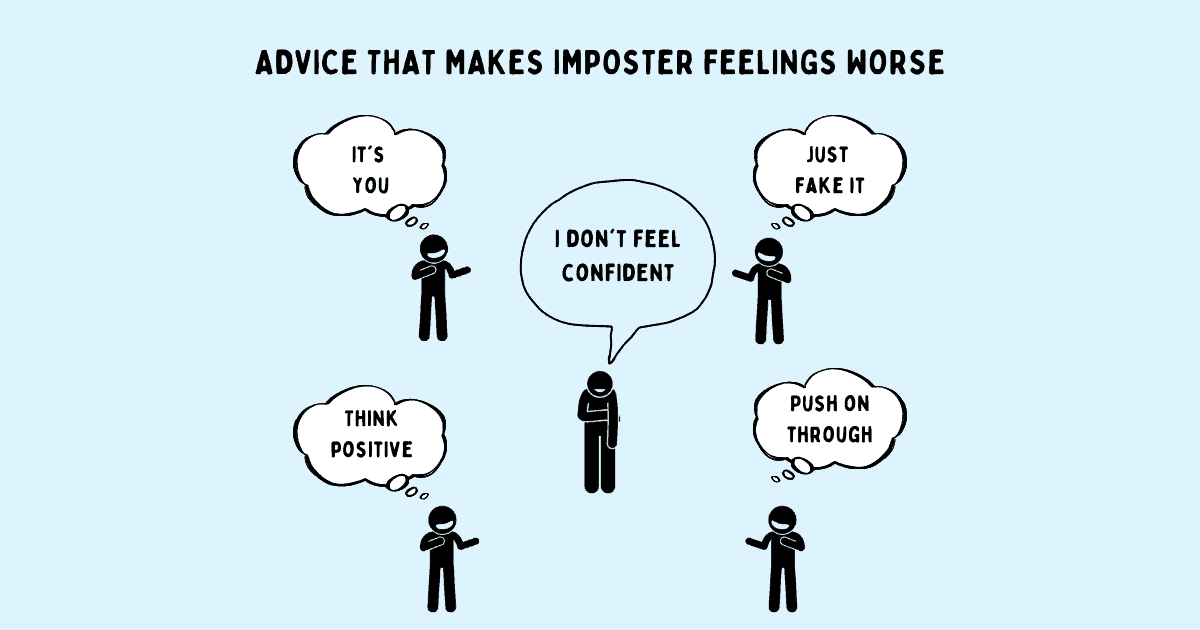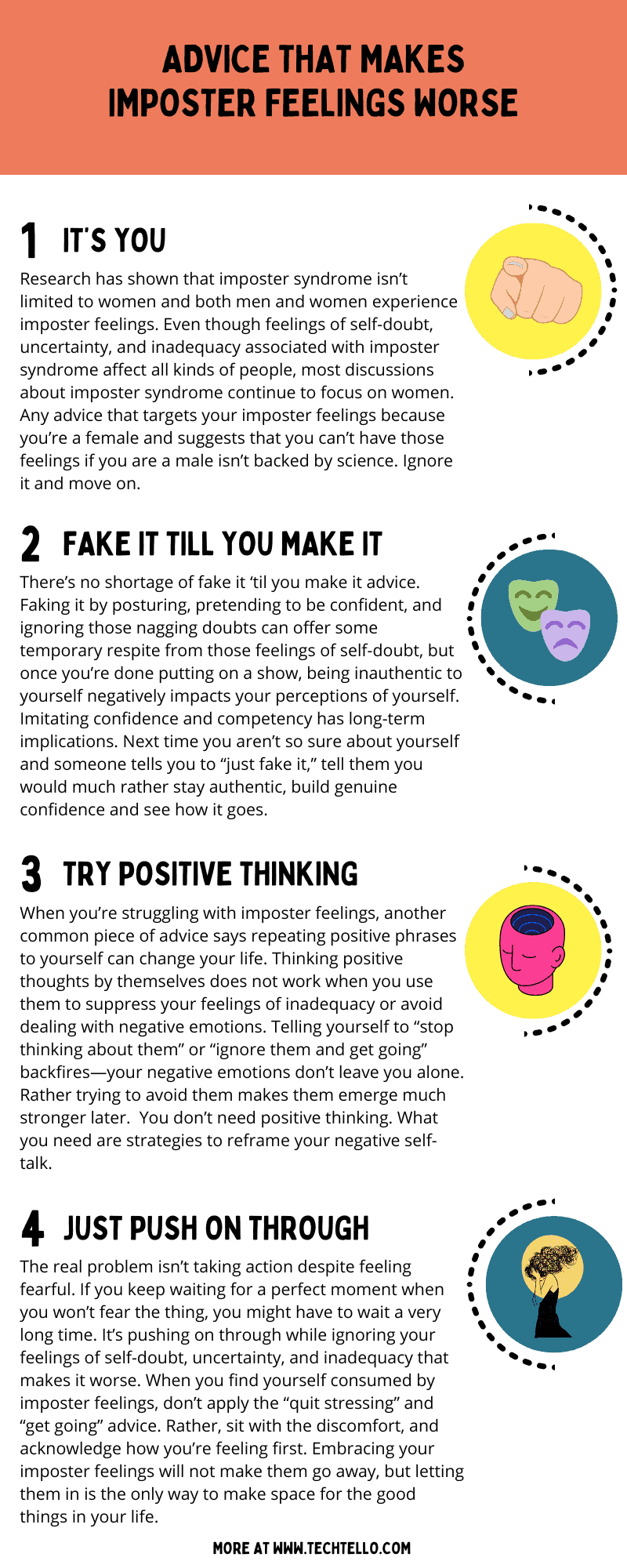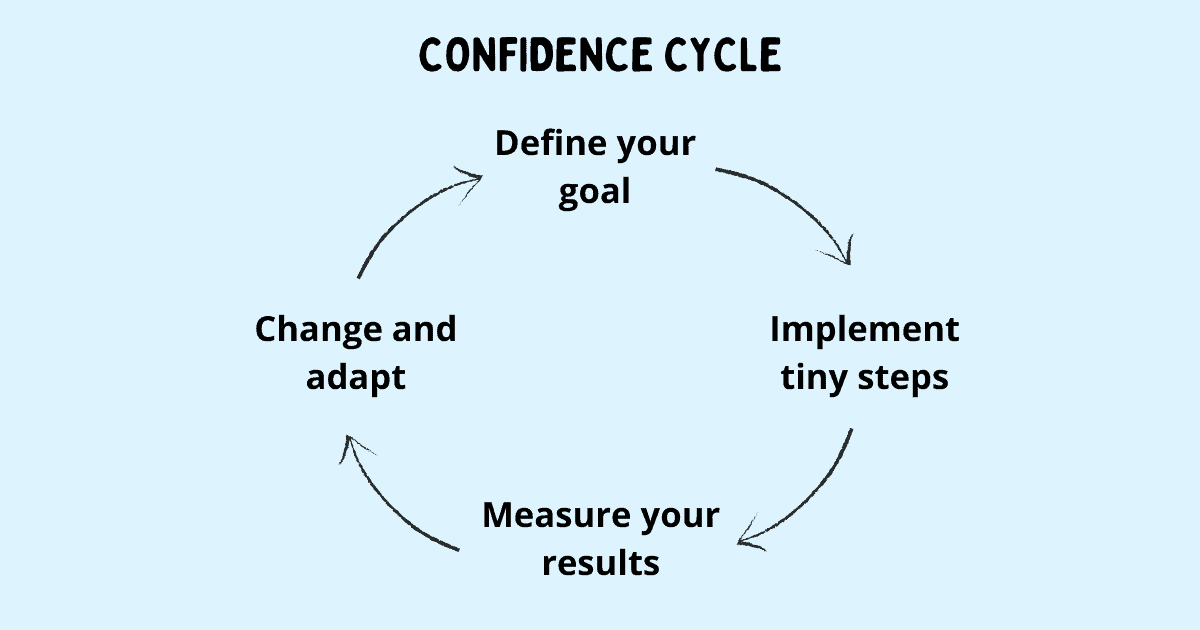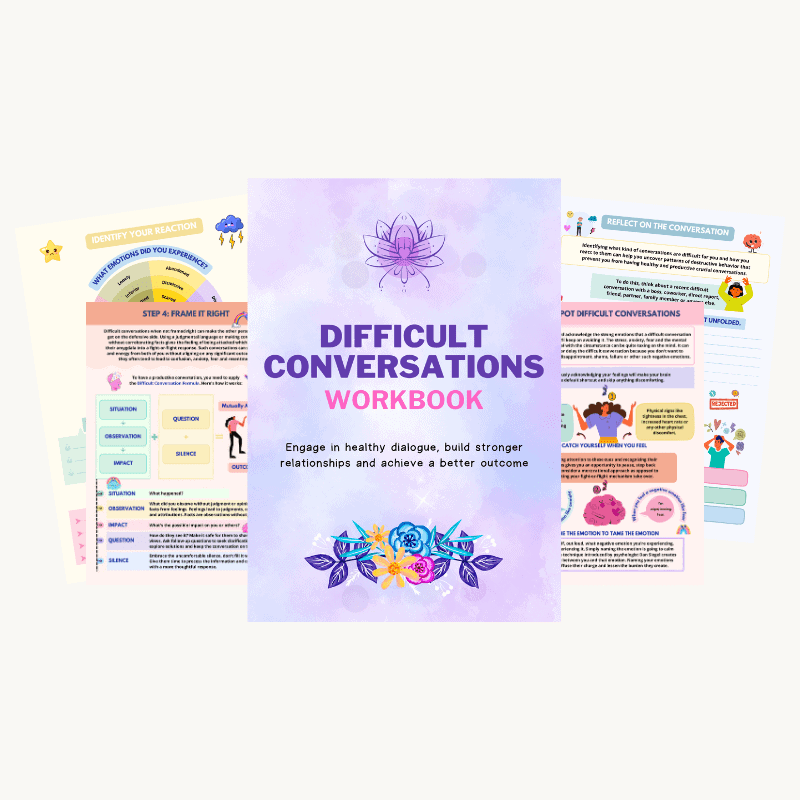Bad Advice for Imposter Syndrome

There’s a wealth of information on managing and getting past imposter syndrome. Just do a Google search and more than 5 million results will vie for your attention. Too much advice makes it hard to separate effective strategies that focus on long-term improvement from coping strategies that are workarounds to get over the temporary discomfort in the short term. Most dangerous are the quick-and-easy fixes and helpful tips: any advice tailored around building confidence by ignoring your feelings of self-doubt doesn’t work. Even if you learn to suppress your low self-esteem and show confidence in certain situations, fixing the symptom without addressing the root cause only makes things worse. Your imposter experience stays with you. It keeps lurking around the corner waiting for the next opportunity to make you feel discouraged and declare you’re incompetent.
When you take the right steps to manage your imposter feelings, it may seem like hard work at first. But, doing them right is the only way to make your effort stick and last long. For example…
- Appearing confident while giving a presentation is different from feeling worthy to give it. Worthiness comes first and then you practice appearing confident.
- Building the courage to speak up at work is different from believing that your ideas deserve to be heard. Acknowledging that you have something valuable to share comes first and then you build the courage to say it.
- Taking up an opportunity to appear capable is different from believing in your ability to make things work. Recognizing your unique talents and skills comes first and then it makes sense to go after the right opportunities.
Don’t go after the band-aid solutions. They will only cover up your feelings briefly by making you feel better for a moment, a day, or perhaps even a week, while leaving you exposed once the effect of those band-aid solutions wanes.
As important as it is to apply the right strategies to manage your imposter syndrome, equally important is to know what constitutes bad advice. Knowing what isn’t helpful will not only save you time, it will prevent you from applying advice that can amplify your feelings of uncertainty and self-doubt.
Four most common pieces of advice for imposter syndrome to avoid at all costs:
- It’s you
- Fake it till you make it
- Try positive thinking
- Just push on through
It’s you
When Pauline Rose and Suzanne Imes first identified the imposter phenomenon in 1978, they theorized that women were uniquely affected by imposter syndrome. Since then, research has shown that imposter syndrome isn’t limited to women and both men and women experience imposter feelings. Even though feelings of self-doubt, uncertainty, and inadequacy associated with imposter syndrome affect all kinds of people, most discussions about imposter syndrome continue to focus on women.
In fact, one study that explored how men and women react to performance conditions (feedback and accountability), identified that men are more likely to experience the imposter phenomenon when given negative feedback regarding their performance. The study concluded with three major findings:
- Men experience higher state stress than women when given negative feedback.
- Men decrease their effort and perform worse than women under conditions of high accountability.
- Women increase their effort and display higher performance when given negative feedback.
Men don’t report feelings of inadequacy and uncertainty about their skills and abilities while women talk about it all the time, not because of the absence of imposter syndrome in men. It’s the cultural gender norms that tell men to suck it up and get going to avoid appearing vulnerable.
This leads to two issues:
- Women who have healthy feelings of self-doubt are made to believe they have imposter syndrome.
- Men who actually have imposter syndrome fail to acknowledge it and adopt unhealthy practices to deal with their feelings of ineptness.
Any advice that targets your imposter feelings because you’re a female and suggests that you can’t have those feelings if you are a male isn’t backed by science. Ignore it and move on.
Fake it till you make it
The most common advice you will hear to deal with feelings of inadequacy is to “fake it till you make it.”
Fake your confidence.
Fake your competence.
Fake your motivation.
There’s no shortage of fake it ‘til you make it advice. Amy Cuddy, a social psychologist, and an author popularized the idea further in her famous TED talk in which she said “Don’t fake it ‘til you make it. Fake it ‘til you become it.”
Faking it by posturing, pretending to be confident, and ignoring those nagging doubts can offer some temporary respite from those feelings of self-doubt, but once you’re done putting on a show, being inauthentic to yourself negatively impacts your perceptions of yourself. Imitating confidence and competency has long-term implications.
This is what happened with Laura Huang, a professor of business administration at Harvard Business School. In college, when Laura was dealing with feelings of uncertainty and self-doubt, she turned to the most popular advice “fake it till you make it”—pretend to be confident and act the part even though you’re secretly nervous and your inner monologue is screaming and telling you’re a fake.
Laura was one of the four females majoring in electrical engineering and had a fear of being stereotyped. So, she tried to act the part of the masculine persona typical of engineering majors “I postured and pretended, but no matter what amount of faking it I put out, I found myself with more self-doubt than when I started.” After college, in her role at a new company, she tried faking it again. This time she took advice from a friend who suggested her to act with the confidence of a white male, but her attempt to fake it backfired “I got pushback. People saw me as aggressive. I felt superficial, came across as inauthentic and wasn’t getting the sort of support or social acceptance that my elite brass male peers were.” Laura later noted that faking it by being inauthentic did not help her. Rather, it negatively affected her performance in the long term.
Consider for yourself.
Let’s say you just finished a big project and your team congratulates you for doing a terrific job. What would be your reaction if you believe that you just faked your way through it? Won’t you discredit all the hard work you put into making things happen, deny your accomplishment and feel like a complete fraud? By identifying yourself as a fake in the “fake it till you make it” advice, you inadvertently end up calling yourself a fraud—someone who actually isn’t competent and was just putting on a show.
In trying to cope with your feelings of inadequacy, consciously choosing to behave in a way that is fake reinforces the belief that you’re indeed a fake. “Fake it till you make it” compounds feelings of imposter syndrome because saying that you were just faking it makes you internalize those negative beliefs about yourself. Sort of a self-fulfilling prophecy.
Alan Ibbotson, founder and coach says that we should bury the phrase completely “It literally means you can’t do it or be it, and you are pretending. For some, they are signing up to be a fake and a phony, a liar and a cheat, someone who isn’t concerned with what others think or even with being authentic in their success — they just want to get away with it, operating on the hope that eventually they’ll make it.”
Managing your imposter feelings isn’t about faking competence in areas you aren’t good at; it requires recognizing your true skills and abilities. Next time you aren’t so sure about yourself and someone tells you to “just fake it,” tell them you would much rather stay authentic, build genuine confidence and see how it goes.
Try positive thinking
When you’re struggling with imposter feelings, another common piece of advice says repeating positive phrases to yourself can change your life, encouraging some version of:
I am successful.
I am confident and competent.
I am not a fraud.
No doubt, being optimistic and staying positive can be incredibly powerful. But thinking positive thoughts only helps when it does not minimize or invalidate how you really feel about yourself. When what you say consciously does not align with how you think about yourself subconsciously, you can’t expect your subconscious part of the brain to sit quiet. It shouts back drifting your mind to the same old thoughts planted deep in your brain through months and sometimes years of rehearsing the negative self-talk “I’m not good enough. I don’t have the competence. They’re soon going to find out.”
For example:
- If you say to yourself “I will succeed,” while deep down you believe that you’re not worthy of success, your subconscious mind is going to fight back “You aren’t worthy and you know it. Don’t fool yourself.”
- If you say to yourself “I’m competent,” while you have the habit of constantly doubting your skills and abilities, your subconscious mind will remind you “Remember all the mistakes you have made at work and all the failures you have had to face.”
- If you say to yourself “I’m not a fraud,” while feeling like a fraud is something you’ve identified with yourself for a very long time, your subconscious mind will tell you “How can you forget about all the times you succeeded because of luck?”
Thinking positive thoughts by themselves does not work when you use them to suppress your feelings of inadequacy or avoid dealing with negative emotions. Telling yourself to “stop thinking about them” or “ignore them and get going” backfires—your negative emotions don’t leave you alone. Rather trying to avoid them makes them emerge much stronger later.
You don’t need positive thinking. What you need are strategies to reframe your negative self-talk. Strategies that will empower you to shift from self-defeating behaviors to constructive action. Strategies that will make your self-talk work for you and not against you. We will learn about these reframing techniques in the later chapters.
Just push on through
When others find you capable and intelligent and really don’t understand what you’re going through, they might suggest this:
Quit stressing.
Get over it.
Just push on through.
The real problem isn’t taking action despite feeling fearful. If you keep waiting for a perfect moment when you won’t fear the thing, you might have to wait a very long time. It’s pushing on through while ignoring your feelings of self-doubt, uncertainty, and inadequacy that makes it worse.
Darren Ryan learned this the hard way. He experienced imposter syndrome at different points in his career, but his feelings of being a fraud intensified when he became CEO of Social Entrepreneurs Ireland at the age of 29. Despite being committed to the organization and feeling passionate about the impact he could make, Ryan was terrified of messing it all up and constantly doubted himself.
At first, when he felt like an imposter, he ignored those thoughts and focused on people around him who believed in him. He disregarded his imposter feelings, gave himself a pep talk, and kept going despite feeling fearful. It didn’t work. Those nagging feelings of self-doubt kept coming back, putting intense pressure on him to do something that he thought he could never possibly achieve. Luckily, Ryan realized that ignoring his feelings wasn’t the solution. To move forward, he needed to embrace how he felt.
What happens though when unlike Darren you refuse to acknowledge your imposter feelings and keep burying, ignoring, and denying them? Working hard to cover them up and forcing yourself to take action can lead to negative ruminations with devastating consequences:
- Mental health issues like anxiety and depression.
- Harmful coping strategies like alcohol or other substance abuse to cope with the stress.
- Feeling of isolation by never letting anyone into what you’re worried about.
- Exhaustion and job burnout from living with a constant fear of discovery.
- Increased feelings of guilt, shame, worthlessness, or hopelessness.
- Limiting professional growth by intentionally passing up opportunities, or quitting before accomplishing your goals.
When you find yourself consumed by imposter feelings, don’t apply the “quit stressing” and “get going” advice. Rather, sit with the discomfort, and acknowledge how you’re feeling first. Embracing your imposter feelings will not make them go away, but letting them in is the only way to make space for the good things in your life.
Don’t settle. Don’t look for shortcuts or quick wins. Don’t go after the fake it till you make it, positive thinking and pushing on through advice. They may give you temporary relief from the burden of your negative thoughts, but becoming addicted to those short-term fixes will make you blind to the long-term impact they have on your life.
This article is an excerpt from my new book Rethink Imposter Syndrome: Build Confidence, Beat Self-Doubt and Succeed.





























